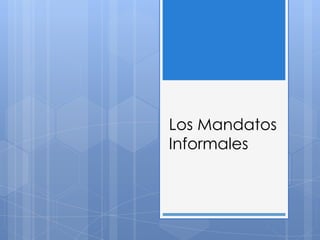
Informal tú commands
- 2. In English, all commands are formed by using the infinitive form of the verb without the word “to”. Please recycle! Plant a tree! Help our cause! Delegate the responsibilities! To make commands negative, place the word(s) “don’t” or “do not” before the command. Don’t liter! Do not forget to collaborate! Don’t throw plastic in the trash!
- 3. En español, informal commands Positive commands are used to tell a friend or are formed by using the relative to do something. “tú” form of the present tense and dropping the -s Statement Positive Command (Tú) trabajar ¡Trabaja! (Tú) elegir (i) ¡Elige!
- 4. Negative commands are formed by the following steps: No + the “yo” form of the present indicative tense Drop the “o” Add the opposite “tú” present indicative ending *para los verbs de “ar”→ -es *para - er /- ir → - as Por ejemplo: (No gastar) No gasto → No gast → ¡No gastes! (No escribir) No escribo → No escrib → ¡No escribas! (No creer) No creo → No cre → ¡No creas!
- 5. *Remember, some verbs have spelling changes in the negative command to preserve vowel sounds: - CAR -GAR -ZAR c → qu g → gu z→c Ej: (No organizar) No organizo →no organiz →¡No organices!
- 6. Circle the verb that expresses commands. Then, check the appropriate column to tell whether the command is positive or negative Positive Negative 1. Te duelen los pies. ¡Deja de correr! _______ _______ 2. Eres antipático. ¡No me hables así! _______ _______ 3. Mañana tenemos un examen. Estudia mucho. _______ _______ 4. Es muy tarde. ¡Duerme! _______ _______ 5. ¡No luches en las revoluciones! Es peligroso. _______ _______ 6. ¡No levantes pesas! Te puedes lastimar la espalda. ____ _______ 7. Come bien. Te vas a sentir mejor. _______ _______ 8. ¡No juegues en la cocina! Papá está trabajando allí. ___ _______ *¿Cómo sabían cuales oraciones expresaban mandatos ? *¿Cuál es la diferencia entre el inglés y el español cuando indentificamos los mandatos?
- 7. Pedro está moviendo a un dormitorio muy estricto en la universidad. Usa la información abajo para hacer una lista de las reglas que él necessita seguir: 1) No fumar 2) Sacar la basura 3) Pagar el alquiler (rent) 4) No comer en la cama 5) Cortar el césped 6) No escuchar música fuerte
- 8. Verbos Reflexivos For reflexive verbs attach the reflexive pronoun to the end of the affirmative command. If the command is 3 or more syllables, add an accent above the letter on which the stress normally falls. REMEMBER: You never add an accent to a pronoun! Verb Positive (affirmative) Command Levantarse ¡Levántate! Moverse ¡Muévete!
- 9. *Negative commands, the order changes to: no + reflexive pronoun + negative command: Verb Negative Command Levantarse ¡No te levantes! Moverse ¡No te mueves!
- 10. Read the following conversation between Madison and her mother, writing down the correct informal commands (affirmative/negative) as you go. Mamá: Madison, ¡1.(cepíllate / no te cepilles) los dientes!; es muy importante cepillarlos diariamente. Madison: Mamá, ¡2.(preocúpate / no te preocupes)! Ya lo hice. Mamá: Vale. ¿Comiste esta mañana! ¿Limpiaste después? ¿Corriste esta mañana? ¿Te estiraste después? Madison: No, he comido todavía pero corrí sin estirarme después Mamá: ¡3.(Come/No comas) ahorita! Y ¡4.(Olvídate / No te olvides) limpiar. También ,¡5.estírate/ no te estires)! Madison: ¡6. ( relájate / no te relajes)! Mamá: BUENO…ZZZZZZZZZZZZZZ… Madison: Ay, ¡No! Mamá, ¡7. (duérmete / No te duermas)! 8. (Despiértate / No te despiertas)!
- 11. Verbos Irregulares Verb Positive Command Negative Hacer haz no hagas Poner pon no pongas Tener ten no tengas Ir ve no vayas Ser sé no seas Venir ven no vengas Salir sal no salgas Decir di no digas
- 12. Use the following information to write a positive and negaive command 1. Venir aquí__________________________ 2. Ser estudioso_______________________ 3. Poner la mesa______________________ 4. Tener calma________________________ 5. Hacer eso __________________________ 6. Decir mentiras______________________ 7. Salir del cuarto______________________ 8. Ir por la leche_______________________
- 13. Video de Mandatos Informales